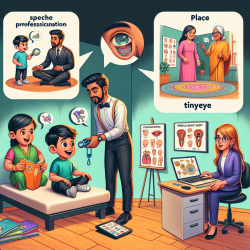As a speech pathologist, continuous improvement and innovation in clinical practice are crucial. The research article "A Speech Pathologist's Fantasy?" by Paul H. Ptacek, PhD, presents an imaginative yet insightful exploration into the potential growth and specialization within our field. This blog post will delve into the key takeaways from Ptacek's work and provide practical steps to enhance your practice.
Understanding "A Speech Pathologist's Fantasy?"
Ptacek's article humorously envisions a world where a simple act of teaching a child to blow their nose evolves into a specialized field within speech pathology. This narrative underscores the importance of recognizing and nurturing emerging areas of practice. Here are some essential insights:
- Innovation Through Observation: Ptacek's fantasy begins with a graduate student's observation and intervention, leading to the creation of a new therapeutic specialty. This highlights the potential for everyday clinical observations to inspire significant advancements.
- Interdisciplinary Collaboration: The article describes how various medical professionals, including pediatricians and audiologists, became involved in the newly dubbed "reverse velar-valving therapy." This underscores the value of interdisciplinary collaboration in enhancing patient care and expanding the scope of speech pathology.
- Research and Development: Ptacek's narrative includes the development of new research methodologies and tools, such as the "Simulated Nasal Output Test" (SNOT Test). This emphasizes the importance of innovative research in validating and refining therapeutic techniques.
Implementing the Insights into Your Practice
Here are some actionable steps to incorporate the lessons from Ptacek's article into your clinical practice:
1. Foster a Culture of Innovation
Encourage yourself and your colleagues to observe and reflect on everyday clinical interactions. Documenting these observations can lead to new insights and potential areas for specialization. For instance, consider keeping a journal of unique cases and therapeutic approaches that show promise.
2. Embrace Interdisciplinary Collaboration
Seek opportunities to collaborate with professionals from other fields. This can be achieved through:
- Attending interdisciplinary conferences and workshops.
- Joining professional networks that include diverse healthcare providers.
- Collaborating on research projects that bridge different areas of expertise.
3. Prioritize Research and Evidence-Based Practice
Stay informed about the latest research and advancements in speech pathology. Allocate time for continuous professional development through:
- Reading peer-reviewed journals and publications.
- Participating in webinars and online courses.
- Conducting your own research or contributing to ongoing studies.
4. Advocate for New Specializations
As new therapeutic techniques and areas of specialization emerge, advocate for their recognition and inclusion in professional standards and training programs. This can involve:
- Presenting at conferences and professional meetings.
- Publishing articles and case studies in professional journals.
- Engaging with professional organizations to promote the adoption of new practices.
Encouraging Further Research
Ptacek's imaginative narrative serves as a reminder of the endless possibilities within our field. By fostering innovation, embracing collaboration, prioritizing research, and advocating for new specializations, we can significantly enhance our practice and improve patient outcomes. To explore the original research paper and gain deeper insights, please follow this link: A Speech Pathologist's Fantasy?










